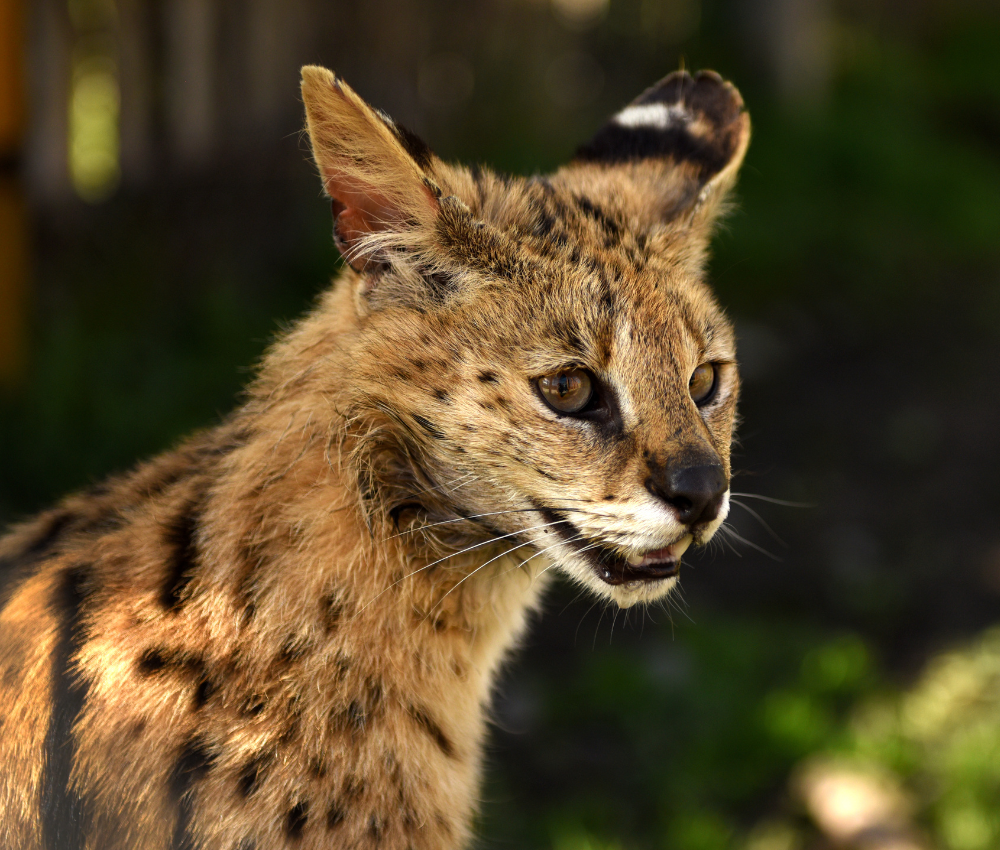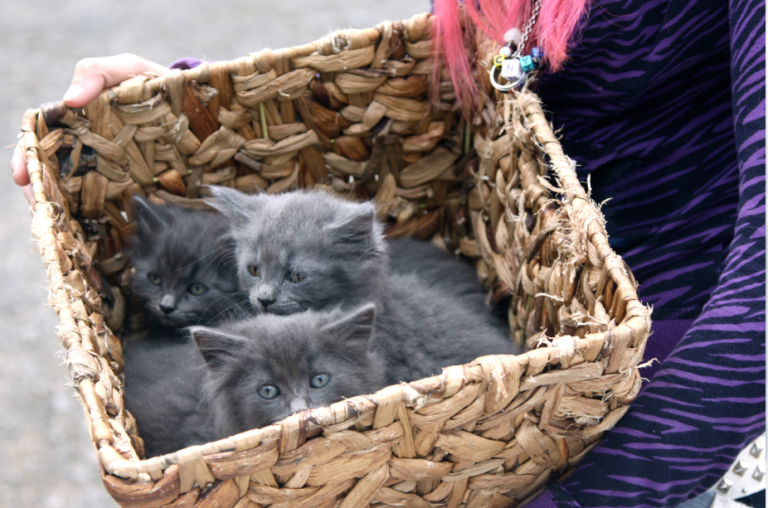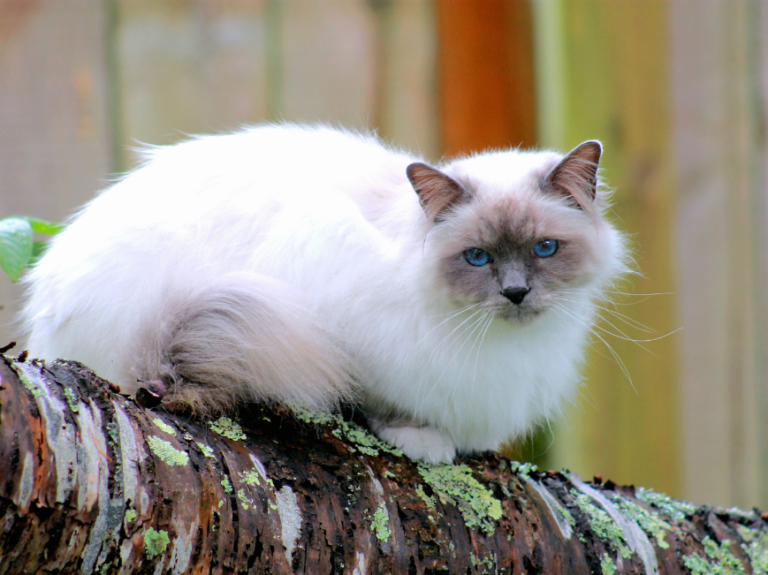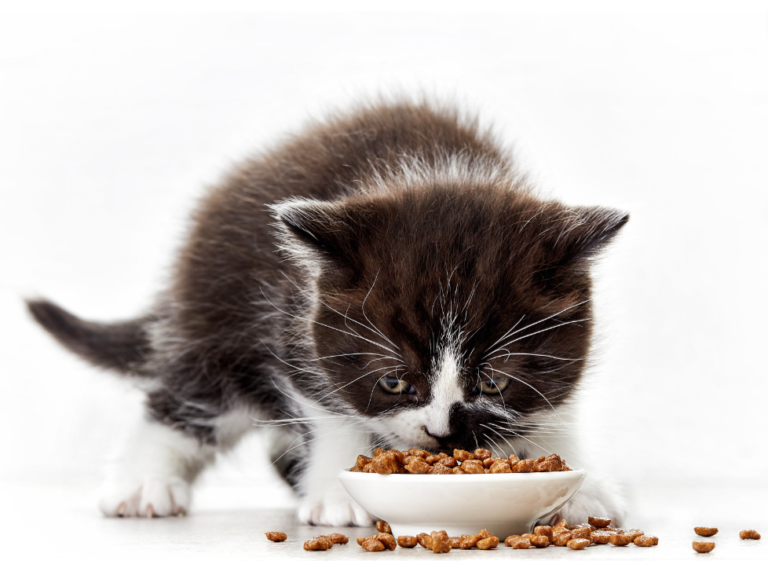1. Understanding the African Savannah Cat
1.1. The Origins of the Savannah Cat
The Savannah Cat is a hybrid breed that traces its roots back to a cross between a domestic cat and an African Serval, resulting in a unique blend of wild and domestic traits. This fascinating breed was first developed in the 1980s when a breeder crossed a male African Serval with a Siamese domestic cat. The result was a kitten named Savannah, who became the foundation of the breed we know today.
The breed quickly gained popularity due to its striking appearance and wild ancestry, leading to further breeding programs that refined its characteristics. Today, Savannah Cats are recognized by major cat registries, although their wild lineage still brings certain challenges and considerations for potential owners.
1.2. Types of Savannah Cats (F1-F5 Generations)
Savannah Cats are categorized by generations, with F1 being the closest to the wild Serval and F5 being more domesticated. Each generation has its own characteristics and legal considerations, which can significantly influence the cat’s temperament, size, and appearance.
- F1 Savannah Cats: These cats are 50% Serval and 50% domestic cat, making them the largest and most exotic-looking of the breed. They are often the most challenging to own due to their wild instincts, but they are also the most sought-after for their striking appearance.
- F2 Savannah Cats: These cats are typically 25% Serval, with the remaining percentage made up of domestic cat breeds. They retain much of the wild look and behavior of the F1 generation but are slightly more manageable.
- F3-F5 Savannah Cats: As the generations progress, the percentage of Serval DNA decreases, and the cats become more domesticated in both appearance and behavior. These later generations are often more suitable for a typical household environment, though they still retain the exotic look and playful nature of their ancestors.
Understanding the differences between these generations is crucial for potential owners, as the care, behavior, and legal implications can vary significantly.
1.3. Physical Characteristics of the Savannah Cat
The Savannah Cat is known for its striking appearance, characterized by a tall, lean body, large ears, and a coat that features bold spots and stripes. These physical traits are reminiscent of their wild ancestors, giving them an exotic and regal presence.
- Size: Savannah Cats are among the largest domestic cat breeds, with F1 males often weighing between 17 to 30 pounds. Later generations tend to be smaller, but they still maintain a tall, slender frame that contributes to their graceful appearance.
- Coat: The coat of a Savannah Cat is short, sleek, and densely packed with vibrant spots and stripes. These markings can vary in color, including shades of gold, brown, silver, and black, depending on the specific generation and lineage.
- Ears and Eyes: One of the most distinctive features of the Savannah Cat is its large, rounded ears, which are set high on the head, giving the cat an alert and curious expression. Their eyes are almond-shaped and can range in color from green to gold, adding to their exotic allure.
The combination of these physical characteristics makes the Savannah Cat a true standout in the world of domestic felines, admired for its beauty and wild charm.
2. The Unique Personality of the Savannah Cat
2.1. Temperament and Behavior
The temperament and behavior of a Savannah Cat are what makes this breed truly unique, blending the independent and wild instincts of their Serval ancestors with the affectionate and playful nature of a domestic cat. Their distinctive personality traits require an owner who is both attentive and understanding of their needs, ensuring that these high-energy felines receive the stimulation and care they need to thrive.
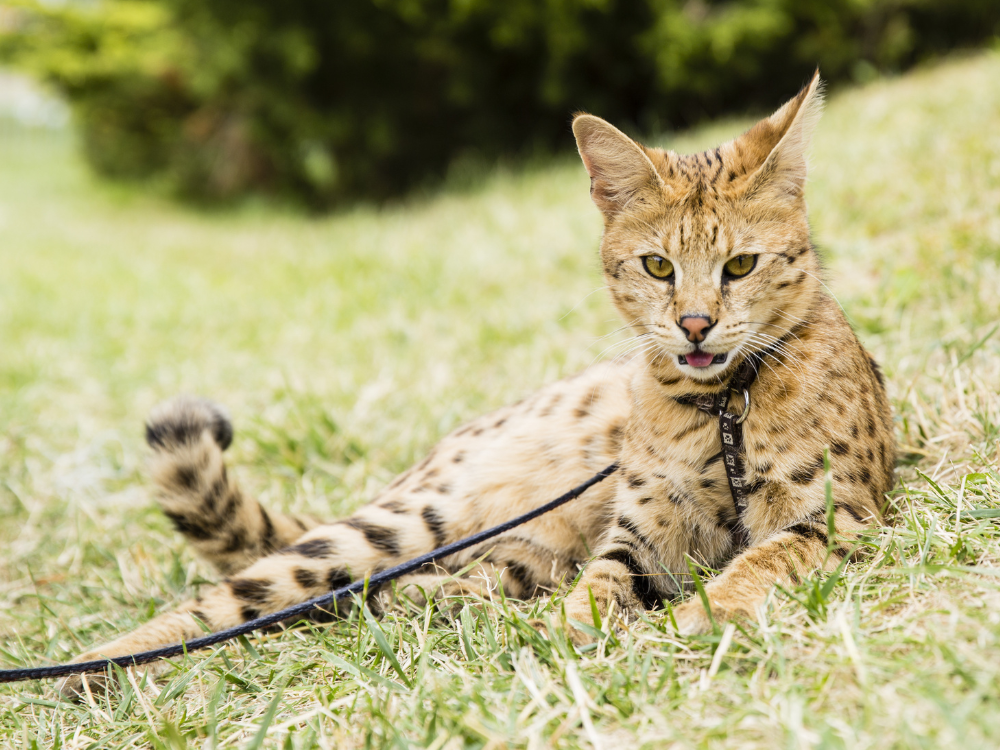
Energetic and Active Nature
Savannah Cats are known for their boundless energy and zest for life. Unlike many domestic cats that enjoy lounging around the house, Savannahs are always on the move, eager to explore their surroundings and engage in various activities. This high energy level is a direct reflection of their wild heritage, where movement and activity are a part of survival. Owners should expect their Savannah Cat to require plenty of playtime, exercise, and opportunities to burn off energy.
Their love for activity means that they often engage in behaviors that are more dog-like than typical cat behavior. For example, Savannah Cats enjoy interactive play sessions and can be trained to fetch, walk on a leash, and even perform tricks. They thrive in environments where they have access to toys, climbing structures, and areas to explore, as boredom can lead to destructive behavior.
Curiosity and Intelligence
Savannah Cats are exceptionally curious and intelligent, which can be both a delight and a challenge for their owners. Their inquisitive nature means they are constantly investigating new objects, spaces, and even people in their environment. They are known to open doors, drawers, and cabinets, so it’s essential for owners to cat-proof their homes to prevent any potential mischief.
Their intelligence also makes them highly trainable, and they can learn commands, tricks, and routines with relative ease. However, this intelligence also means they can become easily bored if not adequately stimulated. Without proper mental engagement, Savannah Cats may resort to finding their entertainment, which could involve knocking over objects, unrolling toilet paper, or exploring areas they shouldn’t.
Playfulness and Hunting Instincts
The playful nature of a Savannah Cat is one of its most endearing qualities. These cats love to play, whether it’s with their owners, other pets, or even by themselves. Their play often involves behaviors that mimic hunting, such as stalking, pouncing, and chasing. These instincts are deeply rooted in their Serval ancestry, where hunting and play are closely intertwined.
Interactive toys, such as feather wands, laser pointers, and puzzle feeders, are excellent for keeping a Savannah Cat engaged and satisfied. Owners might also notice their cat’s penchant for “hunting” small objects around the house, like balls of paper or toy mice. Providing them with plenty of appropriate outlets for these instincts is key to preventing frustration and unwanted behavior.
Affectionate but Independent
Despite their wild appearance and active nature, Savannah Cats can be quite affectionate with their owners. They often form strong bonds with their human family members and enjoy spending time in their company. However, unlike some other cat breeds that are more dependent and needy, Savannah Cats maintain a level of independence. They may seek out attention and affection on their terms, preferring to initiate contact rather than being held or cuddled.
Owners may find that their Savannah Cat follows them from room to room, wanting to be involved in whatever they are doing. They are often described as being “dog-like” in their loyalty and attachment to their owners, but they still retain a sense of independence that is typical of cats.
Adaptability and Socialization
Socialization is an important aspect of a Savannah Cat’s temperament. When properly socialized from a young age, Savannah Cats can adapt well to various environments and situations. Early exposure to different people, pets, and experiences helps them develop into well-rounded and confident cats.
However, their adaptability can vary depending on their generation. F1 and F2 Savannahs, being closer to their wild Serval ancestors, may require more time and patience to adjust to new environments or changes in routine. Later generations, such as F3 to F5, tend to be more adaptable and easier to integrate into a household with other pets or children.
Potential Challenges
While Savannah Cats are wonderful companions, they are not without their challenges. Their high energy levels, intelligence, and curiosity can sometimes lead to behaviors that are difficult to manage for inexperienced cat owners. Additionally, their independent nature means they may not always be as affectionate or compliant as some other breeds.
Owners should be prepared for the commitment that comes with owning a Savannah Cat, including providing ample mental and physical stimulation, ensuring a safe and secure environment, and being patient with their sometimes mischievous behavior. In return, Savannah Cat owners are rewarded with a loyal, engaging, and truly unique feline companion that brings a touch of the wild into their home.
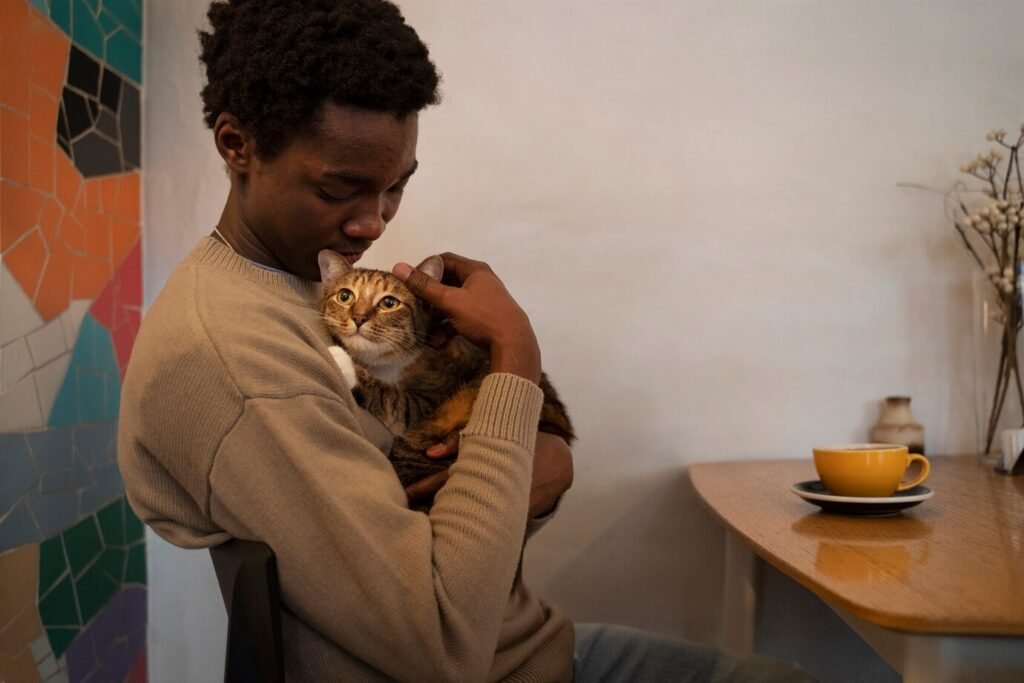
2.2. Socialization and Interaction with Humans
Despite their wild appearance, Savannah Cats can form strong bonds with their owners and are known to be affectionate and loyal companions. However, proper socialization from a young age is crucial to ensure they are well-adjusted and comfortable in a domestic setting.
- Bonding: Savannah Cats are known for their loyalty and can become very attached to their owners. They often enjoy being involved in family activities and may even greet their owners at the door when they come home.
- Socialization: Early socialization is key to ensuring a Savannah Cat develops a well-rounded personality. Exposing them to various people, environments, and experiences from a young age helps them become more confident and less likely to be skittish or fearful.
- Affection: While Savannah Cats are independent and enjoy their own space, they can also be very affectionate. They may cuddle with their owners, purr contentedly, and seek out attention when they want to. However, they often prefer to initiate contact rather than being picked up or held.
Owners who invest time in building a strong bond with their Savannah Cat will be rewarded with a loyal, loving companion who is both fascinating and fun to be around.
2.3. Interaction with Other Pets
While Savannah Cats can get along with other pets, their high prey drive means that introductions should be handled carefully, especially with smaller animals. Their wild heritage can sometimes make them more dominant or territorial, so it’s important to monitor interactions closely.
- Dogs: Savannah Cats can coexist with dogs, particularly if the dog is well-behaved and not overly aggressive. Introductions should be done gradually, allowing both animals to become accustomed to each other’s presence in a controlled environment.
- Other Cats: When introduced properly, Savannah Cats can get along with other cats. However, their dominant nature may lead to conflicts, especially with more submissive or timid cats. It’s essential to supervise their interactions until a stable dynamic is established.
- Small Animals: Due to their high prey drive, Savannah Cats may not be suitable for homes with small pets like birds, hamsters, or rabbits. Their instinct to hunt can be triggered by the movement of smaller animals, leading to potentially dangerous situations.
Owners should take the time to carefully introduce their Savannah Cat to other pets and be prepared to manage their interactions to ensure a harmonious household.
3. Caring for a Savannah Cat
3.1. Diet and Nutrition
A well-balanced diet is essential to maintain the health, energy, and overall well-being of a Savannah Cat. Given their unique lineage and active nature, Savannah Cats require a diet that supports their high energy levels, lean muscle mass, and digestive health. Understanding their dietary needs is crucial for any owner looking to provide the best care for their exotic feline.
High-Protein Diet
Savannah Cats thrive on a diet that is rich in high-quality protein, which is a vital component for maintaining their lean muscle mass and supporting their active lifestyle. Protein should be the primary ingredient in their diet, and it should come from animal sources like chicken, turkey, beef, and fish.
- Animal Protein: The protein in a Savannah Cat’s diet should primarily come from animal sources, as these provide the essential amino acids that cats need for muscle development, repair, and overall health. High-quality commercial cat foods typically list a specific meat as the first ingredient, ensuring that the protein content is sufficient.
- Avoiding Fillers: Owners should avoid cat foods that contain high levels of fillers, such as corn, wheat, or soy. These ingredients offer little nutritional value and can contribute to weight gain or digestive issues. Instead, choose foods with minimal ingredients that focus on high-quality protein and essential nutrients.
- Wet vs. Dry Food: While dry kibble is convenient and helps with dental health, incorporating wet food into the Savannah Cat’s diet is beneficial due to its higher moisture content and richer protein levels. Wet food can also be more palatable, which encourages cats to eat more and stay hydrated.
Raw Diet Options
Some Savannah Cat owners opt for a raw diet, which can more closely resemble the natural diet of their wild ancestors. A raw diet typically consists of raw meat, bones, and organs, providing a range of nutrients that are similar to what a Savannah Cat would consume in the wild.
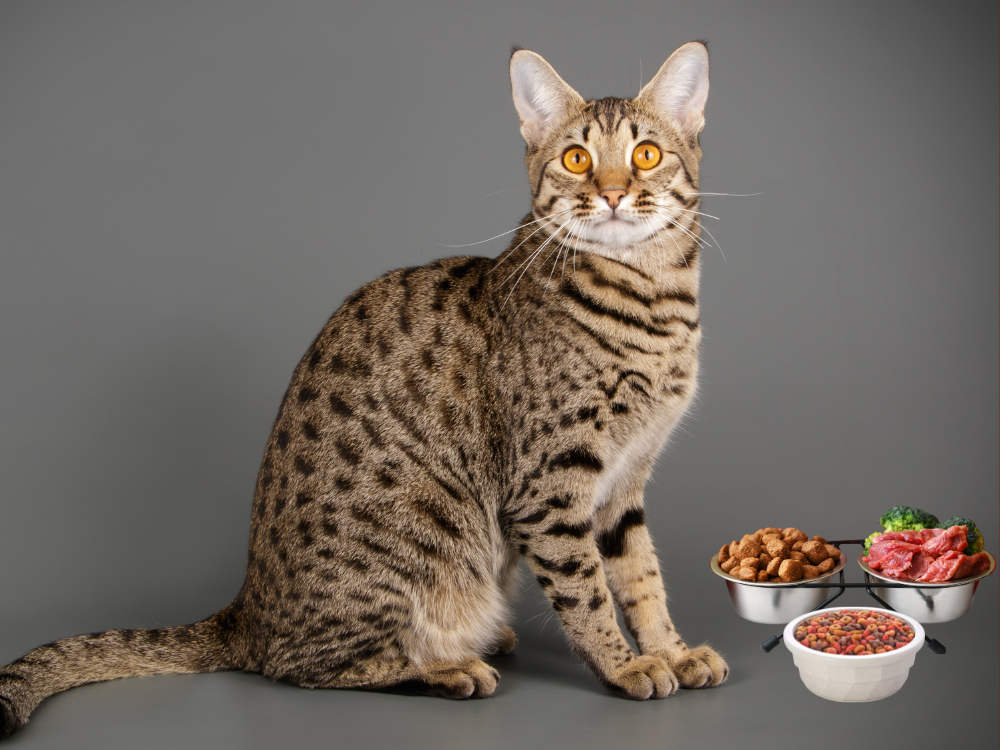
- Benefits of a Raw Diet: Proponents of a raw diet argue that it offers benefits such as improved coat condition, higher energy levels, and better dental health. Raw meat provides enzymes and nutrients in its natural state, which can be more easily absorbed by the cat’s body.
- Risks and Considerations: However, feeding a raw diet requires careful planning and consultation with a veterinarian to ensure it is balanced and safe. Raw meat may contain harmful bacteria like Salmonella or E coli. coli, which can be harmful to both the cat and its human family members. Additionally, a raw diet must be carefully portioned and supplemented with vitamins and minerals to avoid nutritional deficiencies.
- Pre-Made Raw Diets: For those interested in a raw diet but concerned about preparation, many pet stores offer pre-made raw food options that are balanced and formulated to meet a cat’s nutritional needs. These products are often frozen and can be thawed before feeding, offering a convenient alternative to homemade raw meals.
Incorporating Variety
Variety is important in a Savannah Cat’s diet to ensure they receive a wide range of nutrients and avoid developing food sensitivities or allergies. Rotating between different protein sources, such as chicken, turkey, and fish, can help prevent nutritional imbalances and keep the cat interested in their meals.
- Protein Rotation: Regularly rotating the primary protein source in your cat’s diet helps prevent boredom and ensures a more balanced intake of amino acids and other nutrients. It can also reduce the risk of food allergies, which can develop when a cat is fed the same protein over an extended period.
- Supplements: While a high-quality commercial cat food or balanced raw diet should provide all the necessary nutrients, some owners choose to add supplements to their Savannah Cat’s diet. Omega-3 fatty acids, for example, can promote a healthy coat and skin, while probiotics can support digestive health.
- Hydration Needs
Hydration is crucial for Savannah Cats, particularly because their active nature and high-protein diet can increase their need for water. Ensuring they have access to fresh, clean water at all times is essential for preventing dehydration and supporting kidney health.
- Water Intake: Savannah Cats may not always drink enough water from a bowl, particularly if they are primarily fed dry kibble. To encourage hydration, some owners use cat water fountains, which provide a continuous flow of fresh water and can be more appealing to cats.
- Moisture in Diet: Incorporating wet food or raw food into a Savannah Cat’s diet can significantly increase their moisture intake. Wet food contains a higher percentage of water compared to dry kibble, which can help prevent urinary tract issues and keep the cat well-hydrated.
- Monitoring Hydration: Owners should monitor their cat’s water intake and be alert to signs of dehydration, such as lethargy, dry gums, or a decreased appetite. If a Savannah Cat is not drinking enough water, adding a bit of water to their wet food or switching to a higher-moisture diet can help.
Portion Control and Feeding Schedule
Maintaining a healthy weight is important for Savannah Cats, especially given their active nature and large size. Overfeeding can lead to obesity, which can exacerbate joint problems and other health issues. It’s essential to control portions and establish a consistent feeding schedule.
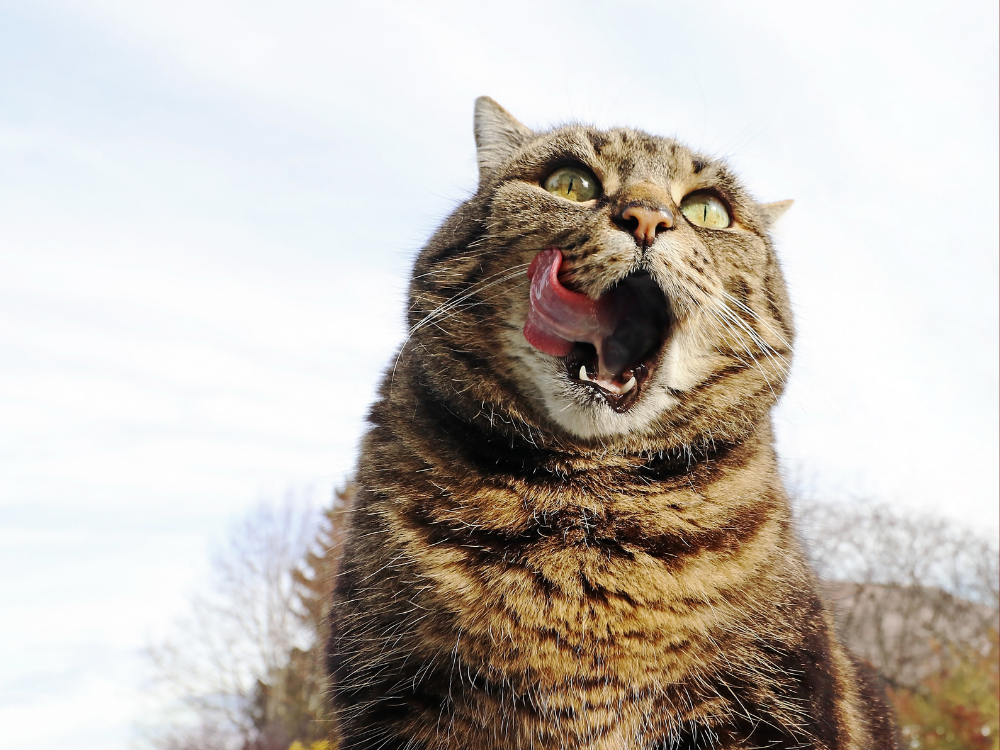
- Portion Sizes: The appropriate portion size will depend on the cat’s age, size, activity level, and metabolism. It’s important to follow the feeding guidelines on commercial cat food packaging, but adjustments may be necessary based on the cat’s individual needs.
- Feeding Schedule: Establishing a regular feeding schedule helps regulate a Savannah Cat’s metabolism and prevents overeating. Most cats do well with two to three meals a day, and some owners prefer to free-feed by leaving out dry kibble that the cat can graze on throughout the day. However, free feeding should be monitored to prevent overconsumption.
- Monitoring Weight: Regularly monitoring your Savannah Cat’s weight and body condition is crucial. If you notice that your cat is gaining or losing weight unexpectedly, it may be necessary to adjust their diet or consult with a veterinarian.
By providing a balanced, high-protein diet, incorporating variety, ensuring proper hydration, and controlling portions, owners can support the health and longevity of their Savannah Cats, ensuring they live active and fulfilling lives.
3.2. Exercise and Mental Stimulation
Savannah Cats require plenty of physical and mental stimulation to keep them happy and healthy, including interactive toys, climbing trees, and regular playtime. Their high energy levels and intelligence mean they need more engagement than the average domestic cat.
- Physical Exercise: Savannah Cats are highly active and need ample opportunities to burn off their energy. Regular play sessions with toys like laser pointers, feather wands, and interactive puzzles can help keep them physically fit.
- Climbing and Exploration: Savannah Cats love to climb, so providing them with tall cat trees, shelves, and perches will allow them to satisfy their instincts. They also enjoy exploring new environments, so rotating their toys and changing up their play area can keep things interesting.
- Mental Stimulation: These intelligent cats require mental challenges to prevent boredom. Puzzle toys, treat dispensers, and training sessions can engage their minds and help prevent destructive behavior.
Ensuring that a Savannah Cat receives adequate exercise and mental stimulation is key to preventing behavioral issues and maintaining their overall well-being.
3.3. Grooming and Maintenance
While Savannah Cats have a short coat that requires minimal grooming, regular brushing and attention to their claws and ears are important aspects of their care routine. Proper grooming helps maintain their coat’s health and keeps them looking their best.
- Brushing: Savannah Cats shed moderately, so weekly brushing can help reduce loose hair and minimize shedding. A soft-bristle brush or grooming glove works well for removing loose fur and keeping their coat shiny.
- Claw Care: Regular trimming of their claws is essential to prevent them from becoming too sharp or overgrown. This can be done at home with cat-specific nail clippers or by a professional groomer.
- Ear Cleaning: Savannah Cats have large ears that can accumulate dirt and wax, so regular cleaning with a vet-approved ear cleaner is recommended. Keeping their ears clean helps prevent infections and ensures they can hear clearly.
By incorporating regular grooming into their routine, owners can help their Savannah Cats stay healthy and comfortable.
4. Health Considerations for Savannah Cats
4.1. Common Health Issues
Savannah Cats are generally healthy, but they can be prone to certain conditions such as hypertrophic cardiomyopathy (HCM) and digestive issues that require careful monitoring. Understanding these potential health concerns is important for maintaining their well-being.
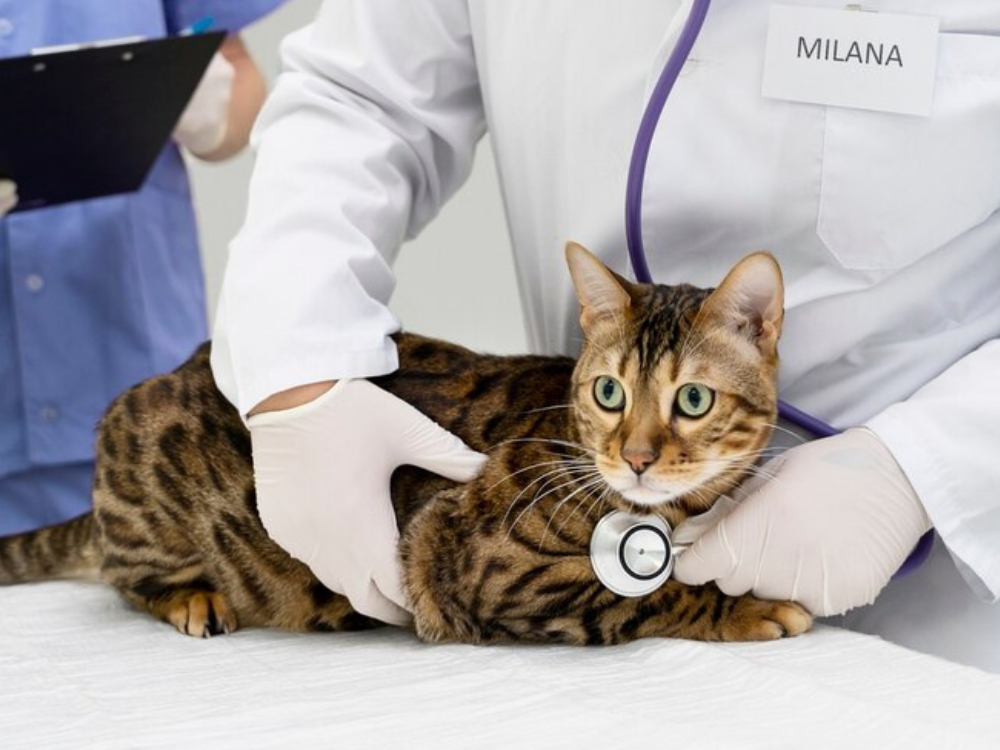
- Hypertrophic Cardiomyopathy (HCM): HCM is a heart condition that affects some Savannah Cats, causing the walls of the heart to thicken. This can lead to heart failure if not managed properly. Routine veterinary visits and monitoring are essential for early detection.
- Digestive Issues: Some Savannah Cats may have sensitive digestive systems, making them prone to gastrointestinal problems like diarrhea or vomiting. Feeding a high-quality diet and avoiding sudden changes in food can help prevent these issues.
- Joint Issues: Due to their large size and active nature, Savannah Cats may be at risk for joint problems such as arthritis as they age. Maintaining a healthy weight and providing joint supplements can help keep their joints healthy.
By being aware of these common health issues, owners can take proactive steps to ensure their Savannah Cats live long and healthy lives.
4.2. Preventive Healthcare
Regular veterinary check-ups, vaccinations, and preventive treatments are essential to maintain a Savannah Cat’s health and detect potential issues early. Preventive care helps protect them from common diseases and keeps them in optimal condition.
- Veterinary Visits: Regular check-ups with a veterinarian are important for monitoring a Savannah Cat’s overall health. Annual exams allow for early detection of any potential health problems and ensure that the cat is up to date on vaccinations.
- Vaccinations: Savannah Cats should receive all recommended vaccinations, including those for rabies, feline distemper, and feline leukemia. These vaccines help protect them from serious illnesses and keep them safe, especially if they spend time outdoors.
- Flea and Tick Prevention: Using flea and tick prevention products is essential, particularly for Savannah Cats that spend time outside or live in areas where these parasites are common. Regular treatment helps prevent infestations and the diseases that fleas and ticks can carry.
By following a preventive healthcare routine, owners can help their Savannah Cats stay healthy and catch any potential health issues early.
4.3. Understanding the Lifespan and Aging
With proper care, Savannah Cats can live long lives, often reaching 12 to 20 years, but their care needs may change as they age. Understanding the aging process and adjusting their care accordingly is key to ensuring they live a comfortable and fulfilling life.
- Lifespan: Savannah Cats generally have a long lifespan, with many living well into their teens or even twenties. Proper nutrition, regular veterinary care, and a stimulating environment all contribute to their longevity.
- Aging Signs: As Savannah Cats age, they may experience changes in their energy levels, mobility, and overall health. Owners should be attentive to signs of aging, such as decreased activity, weight changes, or difficulty jumping and climbing.
- Senior Care: As a Savannah Cat enters its senior years, adjustments to its diet, exercise routine, and healthcare may be necessary. Providing a comfortable environment with easy access to favorite resting spots and ensuring they receive any needed medications or supplements can help them enjoy their golden years.
By understanding the lifespan and aging process of Savannah Cats, owners can provide the necessary care to keep them healthy and happy throughout their lives.
5. Choosing and Living with a Savannah Cat
5.1. Finding a Reputable Breeder
Finding a responsible and ethical breeder is crucial when considering a Savannah Cat, ensuring the cat is healthy and well-socialized from an early age. A reputable breeder will prioritize the health and welfare of their cats, providing proper care and socialization.
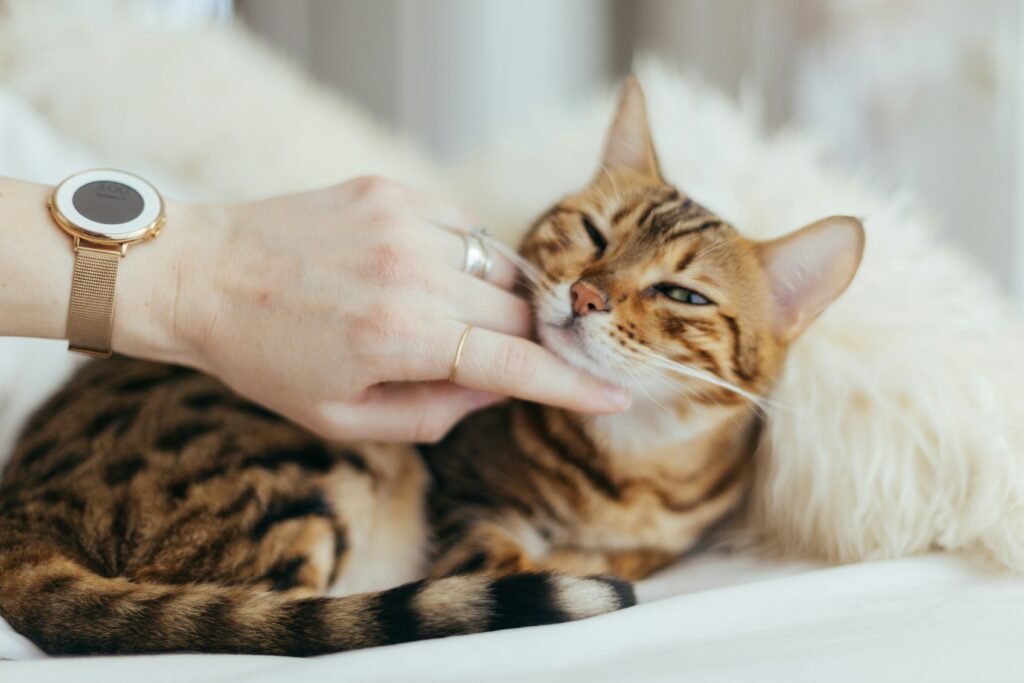
- Research: Prospective owners should thoroughly research breeders, looking for those with a good reputation and a history of producing healthy, well-adjusted kittens. Reviews, references, and a visit to the breeder’s facility can help in making an informed decision.
- Health Screening: A reputable breeder will conduct health screenings for common genetic conditions and provide documentation of the cat’s health history. They should also be willing to answer any questions about the care and upbringing of their cats.
- Socialization: Ethical breeders ensure that kittens are well-socialized from a young age, exposing them to different people, environments, and experiences. This early socialization is crucial for the kitten’s development and helps them adapt to their new home more easily.
By choosing a reputable breeder, owners can feel confident that they are bringing home a healthy, well-adjusted Savannah Cat.
5.2. Legal Considerations and Ownership
5.1. Finding a Reputable Breeder
Choosing to bring a Savannah Cat into your home is an exciting decision, but it’s crucial to start the process by finding a responsible and reputable breeder. The quality of your experience as a Savannah Cat owner can be significantly influenced by the breeder you choose, as they play a key role in the early socialization, health, and temperament of the kittens they produce.
- Researching Breeders: Start by conducting thorough research to identify breeders who are recognized for their ethical practices and commitment to the health and well-being of their cats. Look for breeders who are registered with reputable organizations, such as The International Cat Association (TICA), which sets high standards for breeding practices. Reading reviews, seeking recommendations from other Savannah Cat owners, and visiting the breeder’s website can provide valuable insights into their reputation.
- Visiting the Breeder: Whenever possible, arrange a visit to the breeder’s facility. This will allow you to observe the conditions in which the cats are raised, meet the breeding cats, and interact with the kittens. A reputable breeder will be transparent about their breeding practices, willingly showing you around their facility and answering any questions you may have.
- Health and Genetic Testing: Responsible breeders prioritize the health of their cats and will conduct genetic testing for common hereditary conditions, such as hypertrophic cardiomyopathy (HCM) and other breed-specific health issues. Ask the breeder for documentation of health screenings and veterinary care that the kittens have received. This is an important step in ensuring that you are bringing home a healthy kitten with a strong genetic background.
- Socialization Practices: Early socialization is crucial for Savannah Cats, as it helps them develop into well-adjusted and confident adults. Inquire about how the breeder socializes their kittens, including exposure to different people, environments, and other animals. Kittens who have been properly socialized from a young age are more likely to adapt well to their new homes and form strong bonds with their owners.
- By investing time in finding a reputable breeder, you can ensure that you are bringing home a healthy, well-socialized Savannah Cat that is a good fit for your family and lifestyle.
5.2. Legal Considerations and Ownership
Due to their exotic ancestry, Savannah Cats may be subject to legal restrictions in some areas. It is essential to understand the legal implications of owning a Savannah Cat, as regulations can vary significantly depending on the generation of the cat (F1 through F5) and local laws.
- Understanding Local Laws: Before acquiring a Savannah Cat, research the legal status of the breed in your area. Some states, cities, or municipalities may have specific regulations governing the ownership of Savannah Cats, particularly those of the F1 and F2 generations, which are closer to their wild Serval ancestors. In some places, these cats may be classified as exotic pets and require special permits, while in other areas, they may be prohibited altogether.
- Permits and Licensing: If your area requires permits or licenses for owning a Savannah Cat, ensure that you comply with all legal requirements before bringing one home. Failure to do so can result in fines, confiscation of the cat, or other legal consequences. Working with a breeder who is knowledgeable about the legal requirements in your region can also help navigate this process.
- Housing and Containment Requirements: Some jurisdictions may impose specific housing requirements for Savannah Cats, such as secure outdoor enclosures or restrictions on allowing the cat outdoors without supervision. These regulations are often in place to protect both the cat and the local wildlife, as Savannah Cats have strong hunting instincts and may pose a threat to smaller animals.
- Insurance Considerations: Due to their exotic nature, some insurance companies may classify Savannah Cats differently from other domestic cats, potentially affecting your homeowner’s or renter’s insurance policy. It’s important to check with your insurance provider to understand how owning a Savannah Cat may impact your coverage and whether additional liability insurance is recommended or required.
By thoroughly understanding the legal considerations of owning a Savannah Cat, you can ensure that you are fully prepared to meet all requirements and provide a safe, legal home for your new feline companion.
5.3. Preparing Your Home for a Savannah Cat
Bringing a Savannah Cat into your home requires careful preparation to ensure that your living environment is safe, stimulating, and suitable for such an active and curious breed. Savannah Cats have specific needs that go beyond those of typical domestic cats, so making the right preparations is key to a smooth transition.
- Creating a Safe Environment: Savannah Cats are known for their adventurous and inquisitive nature, which means they will explore every corner of your home. It’s essential to remove any potential hazards, such as toxic plants, small objects that could be swallowed, or unsecured cables. Additionally, ensure that windows and balconies are securely screened to prevent accidents, as Savannah Cats are agile climbers and may be tempted to explore outdoor spaces.
- Designating a Comfort Zone: When first bringing your Savannah Cat home, it’s important to provide a designated comfort zone where they can retreat and feel safe. This space should be quiet and away from high-traffic areas of the home, equipped with a cozy bed, food and water dishes, and a litter box. Allow your cat to acclimate to this area at their own pace before gradually introducing them to the rest of the house.
- Providing Vertical Space: Savannah Cats love to climb and perch in high places, so providing vertical space is essential to keep them happy. Invest in tall cat trees, shelves, and perches that allow your cat to survey their surroundings from above. Creating a vertical environment not only satisfies their instincts but also helps to prevent boredom and reduce stress.
- Enrichment and Stimulation: Savannah Cats are highly intelligent and need plenty of mental and physical stimulation to prevent boredom and destructive behavior. Provide a variety of toys, including puzzle feeders, interactive toys, and scratching posts, to keep them engaged. Regular play sessions with their owner are also important for bonding and ensuring they get the exercise they need.
- Preparing for Interaction with Other Pets: If you have other pets in the home, it’s important to introduce them to your Savannah Cat gradually and carefully. Savannah Cats can be territorial, and their high prey drive may cause issues with smaller animals. Start by allowing your pets to sniff each other’s scent through a closed door before gradually allowing supervised interactions. Patience and careful monitoring are key to ensuring a peaceful coexistence.
By taking the time to prepare your home for a Savannah Cat, you can create a safe and enriching environment that meets their unique needs and helps them adjust smoothly to their new life with you.
5.4. Building a Strong Relationship with Your Savannah Cat
Living with a Savannah Cat is a rewarding experience, but it requires time, patience, and dedication to build a strong and trusting relationship. These cats are known for their loyalty and can form deep bonds with their owners, but they also have independent streaks and may take time to warm up to new people.
- Understanding Their Communication: Savannah Cats are highly communicative and use a range of vocalizations, body language, and behaviors to express themselves. Learning to understand your cat’s communication signals, such as purring, chirping, or tail movements, can help you respond appropriately to their needs and build trust.
- Respecting Their Independence: While Savannah Cats can be affectionate and enjoy interacting with their owners, they also value their independence. It’s important to respect their space and not force interactions, especially when they are adjusting to a new environment. Allowing them to approach you on their terms helps to foster a positive and trusting relationship.
- Interactive Play and Training: Regular play sessions are crucial for bonding with your Savannah Cat and providing the physical and mental stimulation they need. These cats are highly trainable and enjoy learning new tricks or commands, such as fetching or walking on a leash. Incorporating training into playtime not only strengthens your bond but also provides a valuable outlet for their energy.
- Consistency and Routine: Savannah Cats thrive on routine and consistency. Establishing regular feeding times, play sessions, and grooming routines helps them feel secure and reduces anxiety. Consistency in how you interact with your cat also helps them understand what is expected of them and fosters a harmonious living environment.
- Building Trust: Trust is the foundation of any strong relationship with a Savannah Cat. Be patient and gentle in your interactions, using positive reinforcement to encourage desired behaviors. Over time, your cat will come to see you as a reliable and caring companion, leading to a deeper and more fulfilling bond.
By investing time and effort into building a strong relationship with your Savannah Cat, you will create a lasting bond that is based on trust, respect, and mutual affection.
Choosing and living with a Savannah Cat is an adventure that brings both challenges and rewards. These exotic and intelligent cats require a unique level of care and commitment, but for those who are prepared, the experience is deeply rewarding. With the right preparation, understanding, and dedication, you can create a loving and stimulating environment for your Savannah Cat, ensuring a happy and fulfilling life together.
Final Thoughts: Embracing the Wild Elegance of the Savannah Cat
The African Savannah Cat offers a unique combination of wild beauty and affectionate companionship, making it a fascinating addition to the right household. While they require a level of commitment and care beyond that of typical domestic cats, the rewards of sharing your life with such a remarkable animal are immeasurable. With the proper understanding, preparation, and dedication, owning a Savannah Cat can be a deeply fulfilling experience that brings both joy and wonder into your home.
FAQ Section
- Are Savannah Cats legal to own in all areas?
Ownership laws for Savannah Cats vary by location, so it’s important to check local regulations before bringing one into your home. - Do Savannah Cats get along with other pets?
Savannah Cats can coexist with other pets, but their high prey drive requires careful introductions, especially with smaller animals. read more
- What kind of diet is best for a Savannah Cat?
A high-protein diet that mimics their wild ancestors’ nutrition, including raw food options, is ideal for Savannah Cats. - How much exercise does a Savannah Cat need?
Savannah Cats are highly active and require plenty of physical and mental stimulation to stay healthy and happy. read more
- What are the key characteristics of the Savannah Cat?
Savannah Cats are known for their tall, lean bodies, large ears, and bold coat patterns, as well as their energetic and curious personalities.

